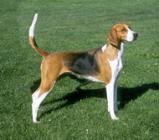
This is a placeholder text
Group text
by gsdsch3v on 10 February 2010 - 05:02
by crhuerta on 10 February 2010 - 16:02
Does it not depend on the individual dogs themselves also?
My only personal experience with this bloodline, is from 3 different dogs.....all 3 have super drives, including my own young female.
What exact "characteristics"...does not make them competent sport dogs??
Robin
by gagsd4 on 10 February 2010 - 16:02
If you go to a club whose helpers only work dogs in prey, or are not skilled in how to develop a sharp/defensive dog, then they can be quite difficult to train/title.
--Mary
by VomMarischal on 10 February 2010 - 18:02
by Elkoorr on 10 February 2010 - 20:02
by Keith Grossman on 10 February 2010 - 20:02
Ideally, I like to see a dog start protection in prey and eventually, as the dog becomes more mature and confident, be pushed into defense. A dog truly working in defense should believe that it is being threatened which is understandably stressful for the dog. That stress is typically alleviated by lowering the level of intensity to allow the dog to switch from defense back to prey before each encounter is concluded.
The bitch in question was not short of prey drive...in fact she had tons of it...she was the first dog I ever had that not only chased squirrels but caught and killed them. That notwithstanding, she was somewhat sharp and protection work was never a game for her; she was serious from the moment she came on the field to until the moment she left it. The helper was not her friend or playmate; the helper was someone she wanted to kill. I was always concerned about that for a couple of reasons. First of all, I could never come to the conclusion that any part of protection work was ever fun for her; it was a fight, plain and simple. More importantly, I worried that without the ability to work her in prey at all, I also had no way to alleviate the associated stress. How do those who have similar dogs deal with this or does it just come with the territory?
by gagsd4 on 10 February 2010 - 21:02
Keith wroteHow do those who have similar dogs deal with this or does it just come with the territory?
My male was much like you describe and by learning that he could control the helper, he began to have fun. At first it was all about defense in the literal sense. But as we taught him his "power" he began to have fun. He would go by the helper, tongue lolling and wag his tail as if to say "bring it on" !
!
But it is harder to work a dog who has a natural fall-back to defense. If you push them too much, too fast (did this with my current female and still trying to patch things up), they go into avoidance. Just because they come on the field with a full grip and lots of forward aggression, does NOT mean they are ready to be pushed. And that is maybe where many of us make the mistakes.
If the handler and helper do things right, (assuming genetics is there), then the dog comes through a serious, stable, strong dog.
BTW- both of the dogs I mentioned had TONS of prey drive for "real" prey. Squirrel catching, chipmunk killers they are . Neither is "pure" DDR but DDR/WGr working mix.
. Neither is "pure" DDR but DDR/WGr working mix.
--Mary
by K-9mom on 10 February 2010 - 21:02
My suggestion for anyone who is asking is to visit the parent sof the dogs you are looking for. Visit kennels and see for yourself. Maybe you will ike them, maybe not. There is no such thing as a PERFECT "Line". To each his own. I will admit that my own Belgian and West Dogs were "harder" in bitework and even handler hard when I first got them started but I know that that is these particular dogs I owned and never make such a blanket statement. I have certainly seen West & Belgian lines who were soft and not driven.
Look around and find the "dog" you want, not the "Line".
by VomMarischal on 10 February 2010 - 22:02
by bgstout on 10 February 2010 - 22:02
thanks
Contact information Disclaimer Privacy Statement Copyright Information Terms of Service Cookie policy ↑ Back to top




